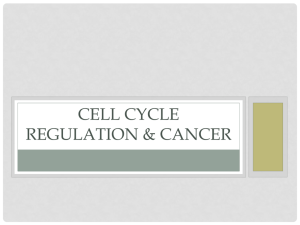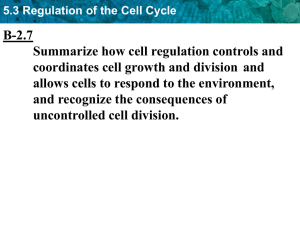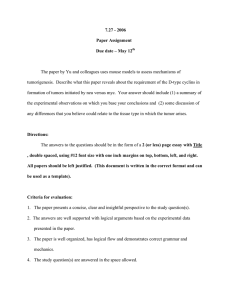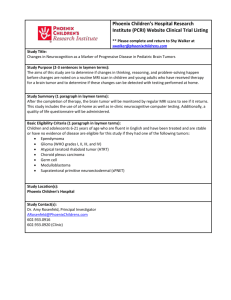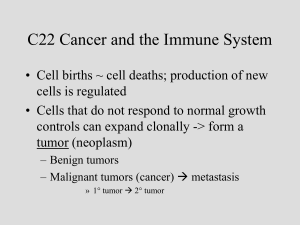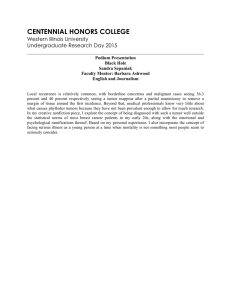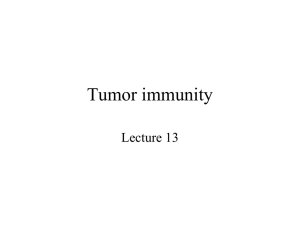Harvard-MIT Division of Health Sciences and Technology
advertisement
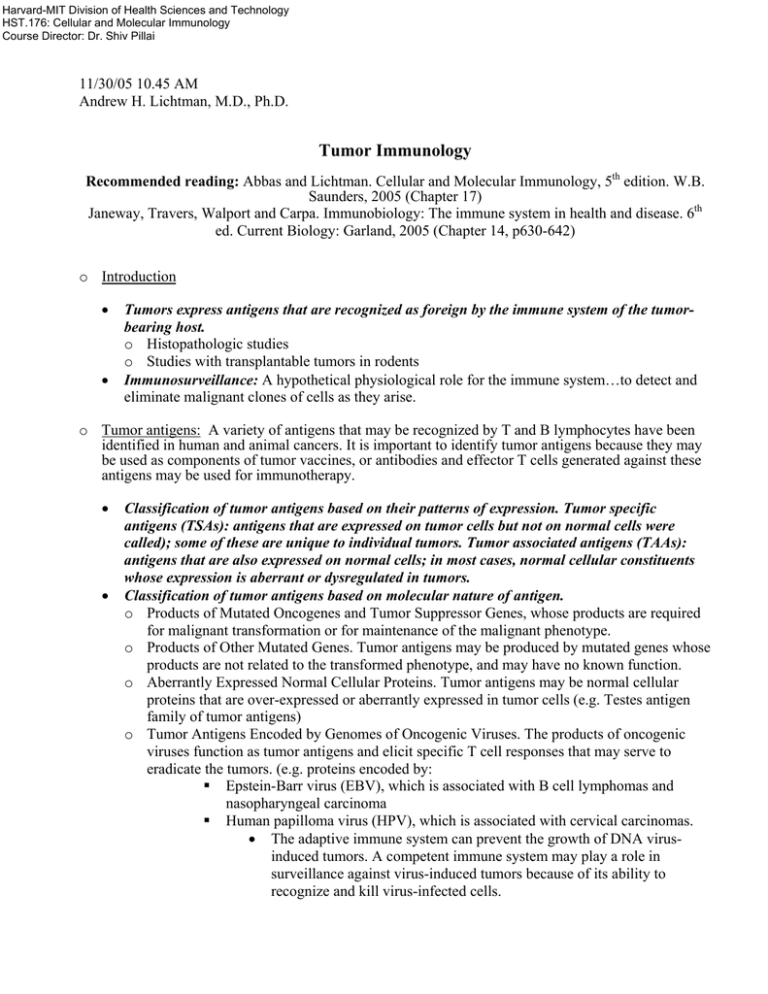
Harvard-MIT Division of Health Sciences and Technology HST.176: Cellular and Molecular Immunology Course Director: Dr. Shiv Pillai 11/30/05 10.45 AM Andrew H. Lichtman, M.D., Ph.D. Tumor Immunology Recommended reading: Abbas and Lichtman. Cellular and Molecular Immunology, 5th edition. W.B. Saunders, 2005 (Chapter 17) Janeway, Travers, Walport and Carpa. Immunobiology: The immune system in health and disease. 6th ed. Current Biology: Garland, 2005 (Chapter 14, p630-642) o Introduction • • Tumors express antigens that are recognized as foreign by the immune system of the tumorbearing host. o Histopathologic studies o Studies with transplantable tumors in rodents Immunosurveillance: A hypothetical physiological role for the immune system…to detect and eliminate malignant clones of cells as they arise. o Tumor antigens: A variety of antigens that may be recognized by T and B lymphocytes have been identified in human and animal cancers. It is important to identify tumor antigens because they may be used as components of tumor vaccines, or antibodies and effector T cells generated against these antigens may be used for immunotherapy. • • Classification of tumor antigens based on their patterns of expression. Tumor specific antigens (TSAs): antigens that are expressed on tumor cells but not on normal cells were called); some of these are unique to individual tumors. Tumor associated antigens (TAAs): antigens that are also expressed on normal cells; in most cases, normal cellular constituents whose expression is aberrant or dysregulated in tumors. Classification of tumor antigens based on molecular nature of antigen. o Products of Mutated Oncogenes and Tumor Suppressor Genes, whose products are required for malignant transformation or for maintenance of the malignant phenotype. o Products of Other Mutated Genes. Tumor antigens may be produced by mutated genes whose products are not related to the transformed phenotype, and may have no known function. o Aberrantly Expressed Normal Cellular Proteins. Tumor antigens may be normal cellular proteins that are over-expressed or aberrantly expressed in tumor cells (e.g. Testes antigen family of tumor antigens) o Tumor Antigens Encoded by Genomes of Oncogenic Viruses. The products of oncogenic viruses function as tumor antigens and elicit specific T cell responses that may serve to eradicate the tumors. (e.g. proteins encoded by: Epstein-Barr virus (EBV), which is associated with B cell lymphomas and nasopharyngeal carcinoma Human papilloma virus (HPV), which is associated with cervical carcinomas. • The adaptive immune system can prevent the growth of DNA virusinduced tumors. A competent immune system may play a role in surveillance against virus-induced tumors because of its ability to recognize and kill virus-infected cells. 11/30/05 10.45 AM Andrew H. Lichtman, M.D., Ph.D. o Oncofetal Antigens are proteins that are expressed at high levels on cancer cells and in normal developing (fetal) but not adult tissues. The genes encoding these proteins are silenced during development, and are derepressed upon malignant transformation. The two most thoroughly characterized oncofetal antigens are carcinoembryonic antigen (CEA, CD66) made by many carcimomas, and alpha-fetoprotein (AFP), made by liver and germ cell tumors. AFP and CEA are important markers of tumor phenotype and growth. o Altered Glycolipid and Glycoprotein Antigens. Most human and experimental tumors express higher than normal levels of and/or abnormal forms of surface glycoproteins or glycolipids, which may be diagnostic markers and targets for therapy. These altered molecules include gangliosides, blood group antigens, and mucins. This class of tumorassociated antigens is a target for cancer therapy with specific antibodies. Altered glycolipid tumor antigens include CA-125 and CA-19-9, expressed on ovarian carcinomas, and MUC-1, expressed on breast carcinomas. o Tissue-Specific Differentiation Antigens. Tumors express molecules that are normally present on the cells of origin. These antigens are called differentiation antigens because they are specific for particular lineages or differentiation stages of various cell types. Their importance is as potential targets for immunotherapy, and for identifying the tissue of origin of tumors. Examples include CD10 (CALLA), and CD20 on B cell tumors, prostate specific antigen on prostatic carcinomas. o Immune responses to tumors. In both experimental animal models and human tumors, immune responses to tumors can be detected, and include innate, antibody, and T cell mediated responses. • CTL responses are the only class of immune response that have clearly been show to be protective in experimental models. o Tumor-specific CTLs can be isolated from animals and humans with established tumors, such as melanomas. Furthermore, mononuclear cells derived from the inflammatory infiltrate in human solid tumors, called tumor-infiltrating lymphocytes (TILs), also include CTLs with the capacity to lyse the tumor from which they were derived. The role of CD4+ helper T cells in tumor immunity is less clear. CD4+ cells may play a role in anti-tumor immune responses by providing cytokines for effective CTL development. In addition, helper T cells specific for tumor antigens may secrete cytokines, such as TNF and IFN-γ, which can increase tumor cell class I MHC expression and sensitivity to lysis by CTLs. IFN-γ may also activate macrophages to kill tumor cells. o How do tumors stimulate CD8+ T cell responses specific for tumor antigens? Most tumor cells are not professional APCs, and cannot stimulate naïve T cells on their own. A likely possibility is cross priming: tumor cells or their antigens are picked up by host APCs, the tumor antigens are then processed inside the APCs, and peptides derived from these antigens are displayed bound to class I MHC molecules for recognition by CD8+ T cells. The professional APCs express costimulators that may provide the signals needed for the differentiation of the CD8+ T cells into anti-tumor CTLs, and the APCs express class II MHC molecules that may activate CD4+ helper T cells as well. 11/30/05 10.45 AM Andrew H. Lichtman, M.D., Ph.D. • Immunodeficiencies in which T cells and NK cells do not function or do not develop are strongly associated with risk of developing cancers. o Evasion of immune responses by tumors • Class I MHC expression may be down-regulated on tumor cells so that they cannot be recognized by CTLs... • Tumors lose expression of antigens that elicit immune responses. • Tumors may fail to induce strong CTL responses because of lack of costimulators, class II MHC molecules, or poor X-priming • The products of tumor cells may suppress anti-tumor immune responses. o immunosuppressive tumor products; e.g. transforming growth factor-β o ligands for T cell negative regulators (Fas L, PD1 ligands) • Tumor antigens may induce specific immunologic tolerance; e.g. regulatory T cells. o Immunotherapy for tumors: Immunotherapy has the potential of being the most tumor-specific treatment that can be devised to treat cancer patients. Immunotherapy for tumors is aimed at augmenting the weak host immune response to the tumors (active immunity), or at administering tumor-specific antibodies or T cells, a form of passive immunity. • Stimulation of Active Host Immune Responses to Tumors o Vaccination with Tumor Cells and Tumor Antigens Immunization of tumor-bearing individuals with tumor antigens. The identification of peptides recognized by tumor specific CTLs and the cloning of genes that encode tumor-specific antigens recognized by CTLs have provided many candidates for tumor vaccines. o Immunization with purified tumor antigens with adjuvants or peptide-pulsed DCs o DNA vaccines expressing tumor antigens. . o The development of virally induced tumors can be blocked by preventive vaccination with viral antigens or attenuated live viruses. Hepatitis B virus (HBV) vaccine may reduce the incidence of hepatocellular carcinoma; HPV antigen vaccines may reduce incidence of cervical carcinoma. Augmentation of Host Immunity to Tumors With Cytokines and Costimulators o Animal experiments and clinical trials are ongoing in which tumor cells are transfected with genes that encode B7 costimulatory molecules and/or cytokines. o Administration of anti-cytotoxic T lymphocyte antigen (CTLA)-4 monoclonal antibody (along with a GM-CSF producing irradiated tumor cell vaccine) to treat murine melanomas. Nonspecific Stimulation of the Immune System. o Bacille Calmette-Guerin (BCG) mycobacterium, as an adjuvant at the sites of tumor growth. o Activating anti-CD3 antibodies, in mice, results in polyclonal activation of T cells and, concomitantly, prevention of tumor growth. • Passive Tumor Immunotherapy. Involves the transfer of immune effectors, including tumorspecific T cells and antibodies, into patients. Passive immunization against tumors is rapid, but does not lead to long-lived immunity. 11/30/05 10.45 AM Andrew H. Lichtman, M.D., Ph.D. Adoptive Cellular Therapy: transfer of cultured immune cells that have anti-tumor reactivity into a tumor-bearing host. • lymphokine activated killer (LAK) • tumor infiltrating lymphocytes (TILs) Therapy with Anti-Tumor Antibodies • A monoclonal antibody specific for the oncogene Her-2/Neu, which is expressed at high levels in some tumors, has shown success in breast cancer patients, and is now approved for clinical use. • Tumor-specific antibodies may be coupled to toxic molecules, radioisotopes, and anti-tumor drugs, to promote delivery of these cytotoxic agents specifically to the tumor (immunotoxins)
